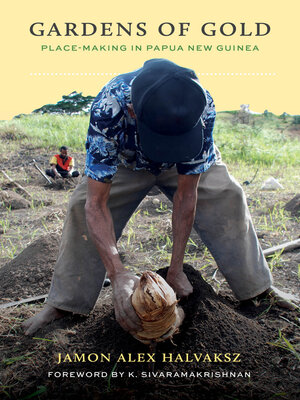Gardens of Gold
ebook ∣ Place-Making in Papua New Guinea · Culture, Place, and Nature
By Jamon Alex Halvaksz

Sign up to save your library
With an OverDrive account, you can save your favorite libraries for at-a-glance information about availability. Find out more about OverDrive accounts.
Find this title in Libby, the library reading app by OverDrive.



Search for a digital library with this title
Title found at these libraries:
| Library Name | Distance |
|---|---|
| Loading... |
"This is a soya bean," the Biangai villager explained, "a money bean."
Since the start of colonial gold mining in the early 1920s, the Biangai villagers of Elauru and Winima in Papua New Guinea have moved away from planting yams and other subsistence foods to instead cultivating coffee and other cash crops and dishing for tradable flakes of gold. Decades of industrial gold mining, land development, conservation efforts, and biological research have wrought transformations in the landscape and entwined traditional Biangai gardening practices with Western capital, disrupting the relationship between place and person and the social reproduction of a community.
Drawing from extensive ethnographic research, Jamon Halvaksz examines the role of place in informing indigenous relationships with conservation and development. How do Biangai make meaning with the physical world? Collapsing Western distinctions between self and an earthly other, Halvaksz shows us it is a sense of place—grounded in productive relationships between nature and culture—that connects Biangai to one another as "placepersons" and enables them to navigate global forces amid changing local and regional economies. Centering local responses along the frontiers of resource extraction, Gardens of Gold contributes to our understanding of how neoliberal economic practices intervene in place-based economies and identities.







